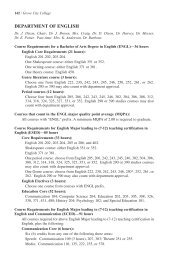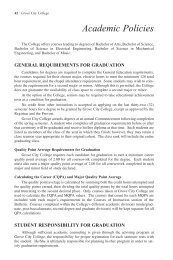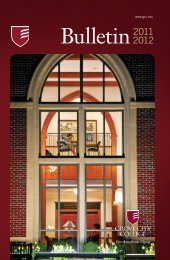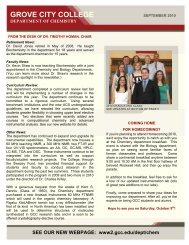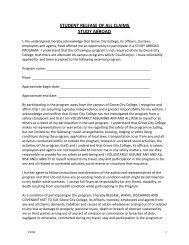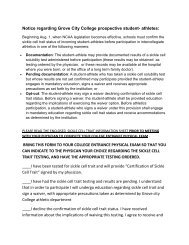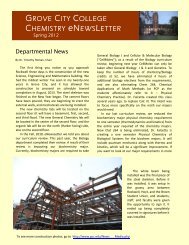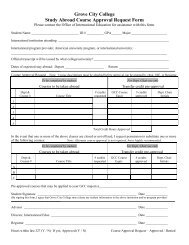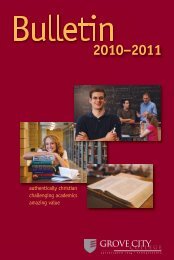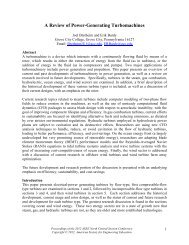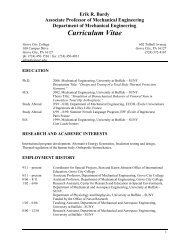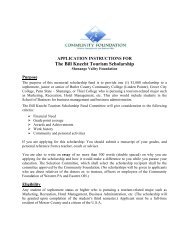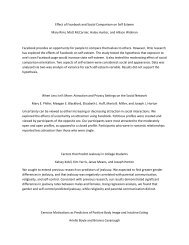2009–2010 - Grove City College
2009–2010 - Grove City College
2009–2010 - Grove City College
Create successful ePaper yourself
Turn your PDF publications into a flip-book with our unique Google optimized e-Paper software.
ACCT 420. GOVERNMENTAL AND INSTITUTIONAL ACCOUNTING. A study of the financial<br />
accounting principles used in the preparation of general purpose financial statements for both federal;<br />
state; and local governmental units as well as for not-for-profit corporations and associations<br />
including colleges and universities; health care entities; and voluntary health and welfare organizations.<br />
Prerequisite: Accounting 401. Spring semester only, three hours.<br />
ACCT 424. ADVANCED AUDITING AND PROFESSIONAL ETHICS. Additional auditing<br />
issues are explored, including practical applications involving the evaluation of audit risk, audit evidence<br />
gathering, and materiality. Legal and ethical issues in auditing are also discussed. Prerequisite:<br />
Accounting 403 and senior standing in Accounting. Spring semester only, three hours.<br />
ACCT 460. INDEPENDENT STUDY. Individual study of specialized topics in Accounting.<br />
Prerequisites: Senior standing and permission of the department chair and a faculty sponsor are<br />
required. Semester course, one, two or three hours.<br />
ACCT 470. INDEPENDENT RESEARCH. An opportunity to conduct supervised research in<br />
Accounting. Senior standing and permission of the department chair and a faculty sponsor are<br />
required. Semester course, one, two or three hours.<br />
ACCT 480. INTERNSHIP IN ACCOUNTING. This is an opportunity for accounting majors to participate<br />
in a meaningful learning experience under the supervision of both an employer and department<br />
faculty member. Most internships take place during the summer months. Students will be graded<br />
based on an employer performance evaluation along with a written paper and journal. Prerequisites:<br />
good academic standing and completion of the sophomore year of study.<br />
Semester course, one to six hours.<br />
DEPARTMENT OF BIOLOGY<br />
Biology / 75<br />
Dr. S. Gribble, Chair, Dr. Brenner, Dr. Dent, Dr. Dudt, Dr. Jenkins, Dr. Ray, Dr. Shaw, Dr.<br />
Sodergren. Part-Time: Dr. Darsie, Mrs. Grewell, Mrs. Yeager.<br />
Departmental policy limits students to one major within the Department of Biology.<br />
Students are expected to contact their advisors for a detailed schedule of courses recommended<br />
to meet requirements for a major.<br />
Course Requirements for Bachelor of Science Degree in Biology (BIOL)<br />
Biology Core (21 hours):<br />
Biology 101-102, 231, 234, 301, and 488.<br />
Clusters (7 hours):<br />
Choose a minimum of one course from each of the following clusters:<br />
Health/Medicine: Biology 302, 311, 312, and 407.<br />
Diversity/Ecology: Biology 305, 320, and 409.<br />
Biology Electives (9 hours):<br />
Nine additional hours of biology from 300-400 level courses.<br />
No more than four credit hours of independent, internship, research, or honors<br />
study (Biology 260, 270, 360, 370, 372, 375, 376, 390, 460, 470, 475, 476, 480,<br />
497, and 499) may be applied to the additional eight hours.<br />
Major-related requirements (12 hours):<br />
Chemistry 101-102; Mathematics 161.<br />
Courses that count in the BIOL major quality point average (MQPA):<br />
All courses with “BIOL” prefix. A minimum MQPA of 2.00 is required to graduate.



